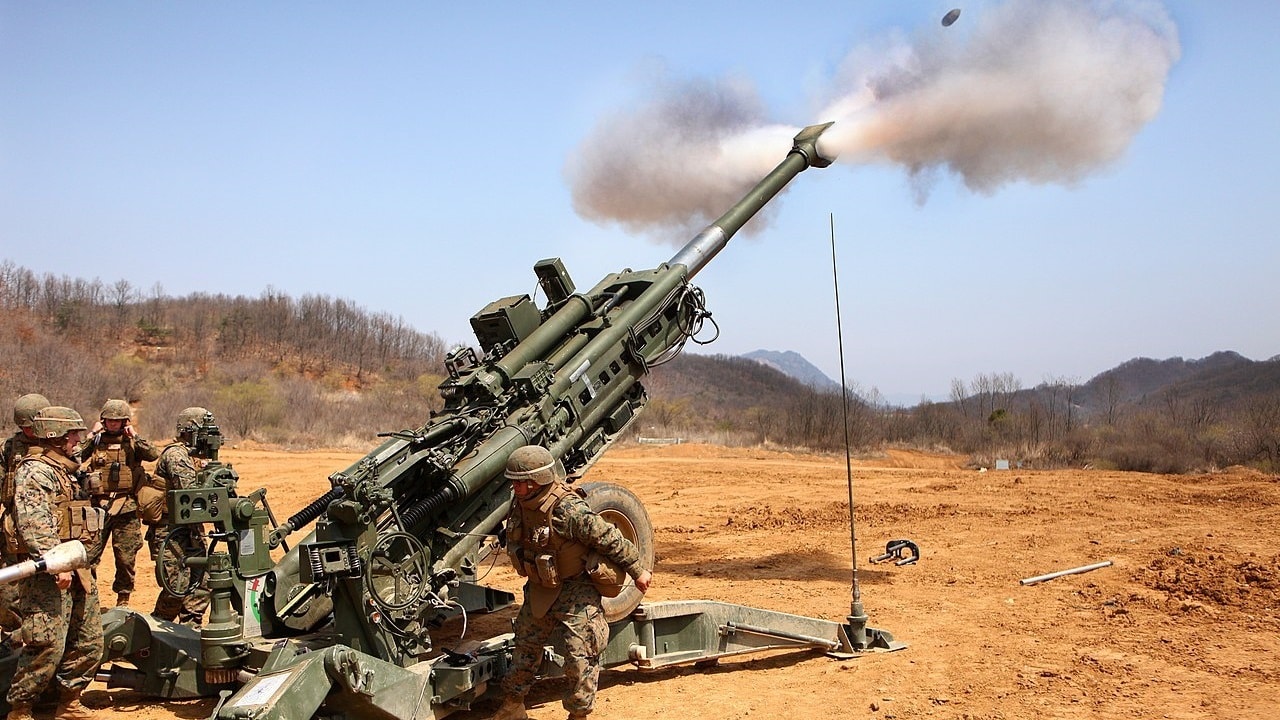Amidst conflagrations in the Middle East, Saudi Arabia is signing big-ticket deals to purchase Cheongung M-SAM II missile defense systems from South Korea and import artillery munition from India.
The deals were inked during the ongoing Riyadh Defense Expo.
Indian defense producer Munitions India Limited (MIL) has won a big $225 million contract to supply artillery ammunition to the Kingdom of Saudi Arabia. The partner of MIL, Nadrah Company, facilitated this milestone agreement.
This is the largest known export order for the Indian Ordnance Factory Board or its successors. In a bid to enhance functional autonomy and efficiency in Ordnance Factories, the Indian government split it into 7 Defence Public Sector Undertakings with 41 Units with effect from October 1, 2021.
In 2017 and 2019, the UAE bought 40,000 and 50,000 155 mm artillery shells, respectively. The order was valued at around US $40 million in 2017 and US $46 million in 2019.
MIL announced the contract on social media X. The signing of the contract was attended by H. E. Ahmad Abdulaziz Al-Ohali, Governor of the General Authority of Military Industries, KSA, and Indian Minister of State for Defense Ajay Bhatt.
MIL is a subsidiary of the Indian Ministry of Defense and a top manufacturer of a wide range of ammunition, not just 155mm but also 105mm and 125mm. Apart from artillery, the massive manufacturing company provides ammunition for several other military uses.
Essentially, the 155 mm round is a very big bullet with four parts: the detonating fuse, projectile, propellant, and primer. Each round is 155 mm, or 6.1 inches, in diameter, weighs around 100 pounds (45 kilograms), and is roughly 2 feet (60 centimeters) long. They are employed in howitzer systems, which tow massive cannons distinguished by the range of angles at which their barrels may be adjusted.
Howitzers are highly sought after by ground troops to eliminate enemy targets from a safe distance since they can attack targets up to 15 to 20 miles (24 to 32 kilometers) away, depending on the kind of ammunition and firing mechanism deployed. The enemy doesn’t get much warning about the incoming firing.
The United Arab Emirates and Armenia have been the known customers of 155 mm shells. An unnamed European country, most probably Poland or Slovenia, recently purchased the artillery shells.
Recently, videos have surfaced from Ukraine about the Indian-made artillery ammunition being used by the Ukrainian forces. Reports circulating amongst Russian and Ukrainian social media suggested that Ukraine has, in all likelihood, received Indian 155mm artillery shells. It was speculated that the munition was HE ERFB BT shells produced by the MIL.
The HE ERFB BB variant of the 155mm artillery shell has high explosive capability and an operating range of slightly over 38 kilometers. According to its technical specifications, the shell can operate well in a temperature range of -20 degrees Celsius to +60 degrees Celsius because of its user-friendly design.
In 2020, Saudi Arabia carried out trials for Bharat Forge’s (a subsidiary of private firm Kalyani Strategic Systems) Bharat 52, a 155 mm, 52 caliber towed howitzer. It was the first artillery gun manufactured by the defense firm, had a range of about 41 km, and could fire six rounds in 50 seconds.
Later, in 2022, Kalyani Strategic Systems announced that it bagged an export order worth $155 million (over Rs 1,200 crore) for artillery guns from an unspecified country. The only thing revealed was that the guns were meant for a “non-conflict” zone. Media reports later indicated that the order was meant for a Middle Eastern country.
The Kalyani Group has multiple variants of the 155 mm artillery guns, including the Advanced Towed Artillery Gun (ATAGS) that has been developed in partnership with the Indian Defence Research and Development Organisation (DRDO). The ATAGS have greater firing range and mobility.
The contract for munitions from Saudi Arabia is likely to have followed the order for the guns.
Forging Defense Ties
The Riyadh defense expo has been serving as a good platform for Saudi Arabia to further its ties with South Korea, Iran, and China. Russia also has a big presence at the expo.

The South Korean defense firm LIG Nex1 signed a US $3.2 billion deal with the Saudi Defense Ministry to export its Cheongung M-SAM II missile defense system to the Kingdom. The deal was signed after the Saudi and South Korean defense ministers met at the World Defense Show in Riyadh on Sunday, the South Korean Defense Ministry said.
The Kingdom increased its budget for military spending in 2024 from 259 billion riyals to 269 billion riyals ($71.72 billion).
The event is perceived as a venue for the Saudi government to exhibit its capabilities to overseas investors, thereby providing multinational companies a chance to investigate their possibilities in one of the world’s fastest-growing economies.
The industry is beneficial for many businesses looking to build a local presence in the Kingdom, as there is a push from the state to develop locally, employ millions of young Saudis, and meet its high-budget defense needs. By 2030, it hopes to have localized more than half of all military spending in the nation.
- Ritu Sharma has been a journalist for over a decade, writing on defense, foreign affairs, and nuclear technology.
- She can be reached at ritu.sharma (at) mail.com
- Follow EurAsian Times on Google News